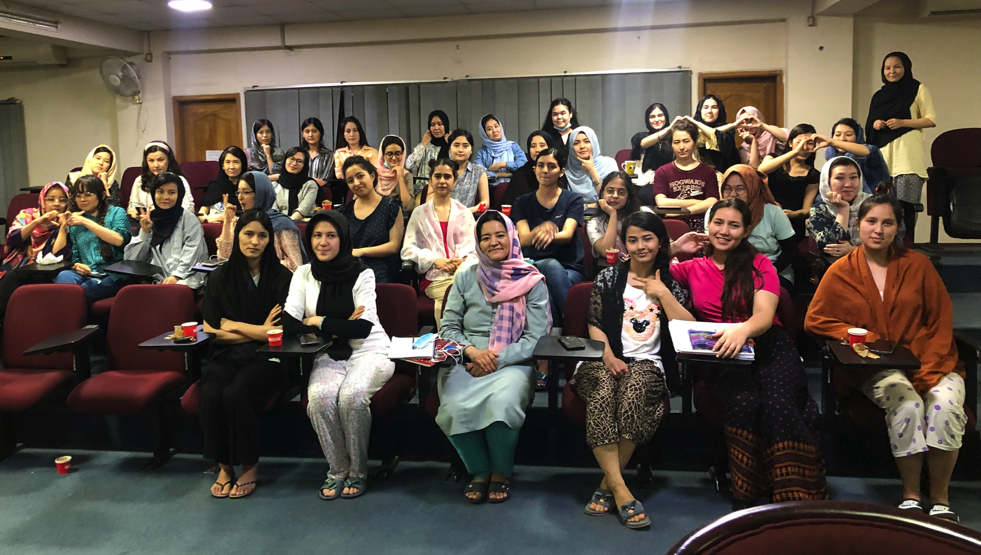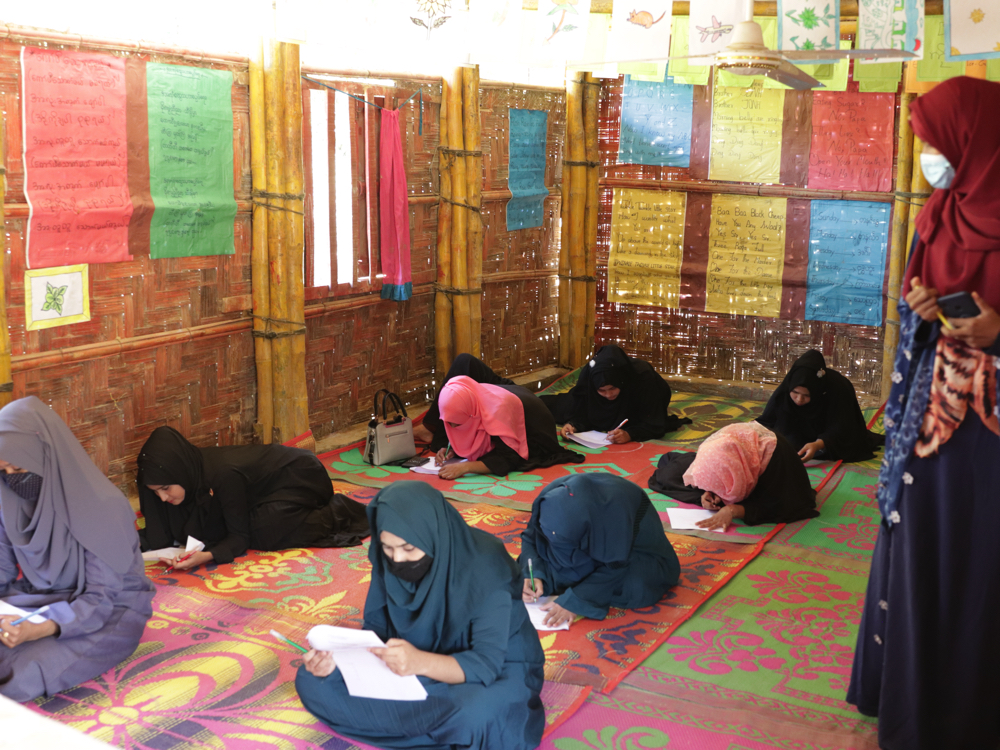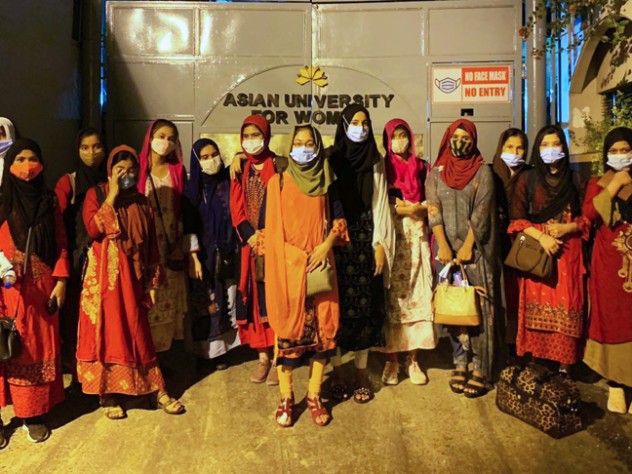8.1.22
ON JANUARY 22, 2022, Anne Hallward ’88, M.D. ’97, a board-certified psychiatrist and host and founder of Safe Space Radio, was sitting in her home in Portland, Maine, when she heard the “ping” of an incoming Facebook message. She clicked. It was an old Harvard friend, Kamal Ahmad ’87.
“This is Kamal,” read the message. “I need your help.”
It had been 33 years since they last spoke. The two had done what many casual college friends do after graduation—following each other’s lives in the background but remaining very much removed from them.
Hallward’s first thought was, “Is this a scam?” She texted the number he linked to the message, asking, “Is this really you?”
It was. “One of the things that happens when you know someone, when you trust somebody, is that your comfort level goes up,” Ahmad says.
Ahmad is currently founder and trustee of the Asian University for Women (AUW), a university located in Chittagong, Bangladesh, that seeks to educate women from all over Asia so they can become skilled and educated professionals. As president and CEO of the AUW Support Fund, he leads the university’s long-term planning for programs, enrollment, and campus construction, while also orchestrating resources to fund its current and future operations.
The idea for the AUW was conceived in the 1980s when Ahmad was an undergraduate, but it wasn’t until 2008 when the first student cohort of 147 arrived on campus: women from India, Pakistan, Cambodia, Bangladesh, Nepal, and Sri Lanka. The university has received donations from AUW co-founder Jack Meyer, the former head of Harvard Management Company, as well as current and former Harvard presidents Lawrence S. Bacow and Derek Bok. It has also received a land grant from the Bangladesh government, and $15 million from the Bill and Melinda Gates Foundation. By the time AUW celebrated its tenth anniversary in 2018, the student body had grown to 540 and expanded to several more countries.

AUW students gather in a classroom setting
Photograph courtesy of Kamal Ahmad
Then the pandemic hit in 2020, and the students had to return to their home countries. In August 2021, when the Taliban returned to power in Afghanistan, Ahmad was able to evacuate 148 AUW students safely by boarding them onto a U.S. aircraft and monitoring their movements through tracking apps installed on their phones. He coordinated with U.S. universities to place all 148 students at institutions such as Arizona State University and Brown. News outlets such as the The New York Times, Bloomberg, and The Chronicle for Higher Education all spotlighted the evacuation feat.
During the winter of 2021, he launched a new phase of recruitment, organizing a campaign across all 34 provinces of Afghanistan to choose several hundred aspiring Afghan students from an applicant pool of more than 7,000. After working with the government of Bangladesh to arrange transit visas into Pakistan for the students, this past February 27, AUW successfully enrolled 171 new Afghan women. But the university still faced its biggest challenge. Nearly all the counseling staff had left during the pandemic, just as AUW began welcoming an influx of these new students, all of whom had suffered some form of trauma, disruption, and loss as the Taliban re-entered their lives.
Although decades had passed since Ahmad and Hallward had last spoken, he knew she would help, no questions asked. She agreed to design an online mental-health curriculum for the women of AUW—a series of 12 lectures and 21 writing workshops. She recruited counselors, artists, and writers from around the country to deliver the lectures and facilitate the workshops this past spring. What could have been merely an administrative favor to an old friend quickly transformed Hallward’s previous conception of what “international development” means in the context of these women’s lives.
The Importance of Answering Back
AHMAD’S INTEREST in international development sprang from his experiences as a five-year-old living in Bangladesh (then East Pakistan) during the Bangladesh Liberation War. At age 14, sparked by the conflict he’d witnessed in his home country, he founded a series of internationally funded afternoon schools for teenage domestic workers in Dhaka, the province where he grew up. As a freshman at Harvard in 1983, he launched the Overseas Development Network (ODN), a program that engaged college students from more 70 U.S. colleges and universities in raising funds for projects in developing countries and increasing the public awareness of world poverty. As a student, Ahmad also found a mentor in then-President Bok, who, in his Commencement address to the class of 1985, described Ahmad “as one of those rare individuals who think, act, speak, and work with just one thing in mind: the welfare of the poor and the historically disenfranchised peoples of the world.”
Ahmad also credits Henry Rosovsky (now Geyser University Professor emeritus, and former dean of the Faculty of Arts and Sciences), as an “integral” part of the formation of the AUW. Rosovsky chaired the Task Force on Higher Education in Society in 2000, convened by the World Bank and UNESCO. Its recommendations, along with “many, many conversations,” spurred the creation of the AUW.
Hallward’s interest in international development, the subject of her social studies thesis, had been piqued, too. She had received a Radcliffe grant to conduct research in the Philippines—and spent the summer before her senior year living with a nun who taught kindergarten to children in a squatter settlement in Manila. Cockroaches and rats skittered over her as she slept.
One day, the nun had been asked by a New York Times reporter what her measure of success was when teaching her children. Hallward still remembers her calm reply: “I am a Catholic nun and I represent authority. And I know that our work is doing good when in this community of the poorest of the poor, someone answers back to me. That’s when I know our work is taking hold.”
“I was lit on fire by this,” Hallward says. “What if international development is something that happens inside the person?” Most of her courses on international development focused on intervening and re-building national institutions through policy work and research. But what if it were just as important to develop individuals’ sense of self?
She continued on to Harvard Medical School to earn her degree in psychiatry, and eventually, in 2008, established Safe Space Radio, a “public health intervention on air.” The show creates a community for individuals to address their mental-health issues, free of cost or stigma, in the absence of that support in their own lives. For the past 14 years, across 300 episodes, Hallward has been helping people cope. So when Ahmad explained to her that he needed a program to help the AUW women cope—to help them fall asleep at night and come back into themselves—Hallward knew she could help. “It was a beautiful fit,” she says.
Everyone Is a Writer
SHE BEGAN BY REACHING out to her radio contacts: teachers, authors, activists, counselors: “They all said, yes, yes, yes.” Hallward contacted Three Hundredth Anniversary University Professor Martha Minow, former dean of Harvard Law School, for advice and brought on a few more names. “Once Anne got going, we didn’t have to do anything,” says Ahmad. By March 24, she had 12 lectures and 21 writing workshops lined up for the semester.
“Today, I want to talk to you about writing,” said Elyssa Ely to a Zoom screen peppered with the faces of young Afghan, Rohingya, and Bangladeshi women in April. Ely, a Boston-based psychiatrist and writer, delivered the fifth lecture in the series.
“There is a man who lives in China,” she told the class. “He works all day in the mines. He comes home at night, and writes poetry on the backs of pieces of newspaper. Here is one of his poems.”
Sing of great sorrow and great joy, sing of great love and great hate
The downpour of Qinqiang enlightens you
Makes you realize
To live is to shout at the sky.
“Some of you may have had terrible experiences in your lives,” she told the students. “But why do you think, when this man could do a number of other things at the end of his day, he chooses to write? Because writing is like opening a window in your head, and letting out some of the pressure.” She paused, then continued: “Every single person in this room is a writer.”
Before becoming involved with the AUW, Ely participated in “The Things They Carry Project,” a series of free writing workshops offered by trained psychotherapists and writers to promote resilience, healing, and self-care. Started by writer and psychoanalyst Kerry Malawista during the worst of the pandemic, the project was designed to serve healthcare workers and school personnel, but Hallward wanted to offer this service to the AUW students. She consulted Ely to help build curriculum for similar writing workshops, in addition to the 12 weekly lectures. Ely helped design curriculum and train more than 30 volunteer therapists for the workshops that took place over a six-week period.
After the first lecture in the general series, Hallward asked for feedback from the students. Many of the young women were yearning for something very simple: friends. So, she decided to call the workshops “Friendship Writing Groups” to underline the importance of using writing to facilitate community, process things together, bond, and celebrate how far the women had come.
Ely recognized that the women arriving at AUW had experienced trauma that they weren’t going to be eager, or willing, to discuss with strangers. Many of them even kept their cameras off because they weren’t used to drawing attention to themselves or being seen. But addressing the past explicitly wasn’t Ely’s approach. The workshops often started with 15-minute segments to respond to “light” questions such as, “What is the meaning of your name?” “What is your favorite fruit and why?” or “Who do you admire most?”
“Trauma is the tenor of their lives,” says Ely. “We wanted to begin with something simpler.”
At the beginning of the semester, one AUW student tragically died. Instead of prompting the students to write directly about their grief, facilitators asked the women to write about how they would comfort a friend who experienced loss. This indirect approach, Ely said, was effective. Eventually, more women started to turn on their cameras and even, albeit anxiously, share some of their work.
This is how the act of writing became a way for the women to strengthen their sense of identity, through a process that employs art not just as a mode of adornment or escapism. “We wanted to build tools for resilience within oneself, “ says Ely, “but also a sense of community among students who were lonely and didn’t know how to begin their new lives.”
The exercise “is not just about cathartic processes, but to actively dream together as a collective. To think together,” says Martha Gonzalez, another facilitator, who ran the last workshop of the semester on songwriting. Gonzalez is a Grammy-award winning musician, ethnomusicologist, and associate professor in the Intercollegiate Chicana/o and Latina/o department at Scripps College.
Her workshop was about process, not product. She did not impose any aesthetic ideas. Instead, what was most valuable were the debates and conversations that arose from the work. By the end, there were no diagnoses or plans. The students had something that was theirs. By writing, they were re-building themselves. “When people think about social movements, they think about the picket lines and protests,” says Gonzalez. “Our job is to think of new ways to get people to harness energy.”
Much of this work—most of it, in fact—originates from the idea that there are perhaps better and more lasting ways to change people and places than focusing on a diagnostic approach. “We didn’t want to come in with a Western, colonizing mental-health perspective—to focus on pathology,” Hallward explains. “We didn’t want to talk about ‘da-pression’ and anxiety.” Methodologically similar to Safe Space Radio, the work done with the AUW women was about fostering a community to support the mental health of members, rather than to eliminate and cure.
Friendship’s Rewards
“WHEN IT COMES TO DEVELOPING countries,” says Ahmad, “there is a higher level of sectarianism. Instead of thinking in broader ways, people think in terms of their narrow sense of community.” In creating AUW, “We thought it would be important to bring together a community which was drawn from all across Asia.”

Rohingya students taking the admissions test
Photograph courtesy of Kamal Ahmad
Not only are the students from diverse ethnic backgrounds, they already possess a strong sense of justice and courage. In fact, the three qualitative criteria Ahmad established for admission were demonstrated courage, a willingness to respond to injustice, and a strong sense of empathy. But Ahmad and Hallward—and Ely,Gonzalez, and their colleagues—believe that in order to harness these qualities the women must feel peace within themselves.
Ahmad has plans to move hundreds more women out of Afghanistan in the coming weeks, with the goal of reaching 600 Afghan students at the university. The AUW is also proposing to authorities in Kabul to start an online teaching program through which girls in grades 7-12, who are barred from attending school, can learn at home, taught by students at the AUW’s Graduate School of Education. He’s also working to create a program for Harvard College graduates can teach at AUW in Bangladesh for a year. “One of our hopes,” he says, “is that people will think of us as a way to engage their intellectual capital for the benefit of these young women.”
The writing workshops will continue in the fall, too—not just for the students, but also for the facilitators, as it was “profoundly life-affirming” to be involved in the work, Hallward says. Knowing Ahmad in college, and seeing the Facebook ping 33 years later, “Friendship is at the core of this whole venture.”
About a month ago, one of the AUW students discovered she was pregnant. Her husband had gone missing. This will be the first time a student gives birth in the dorms. So, the rest of the students mobilized to organize a baby shower and build a nursery in one of the classrooms.
“Friendship is so much of what helps people feel happy and calm, and [is] at the heart of mental health,” says Hallward. Ahmad smiles in agreement.

